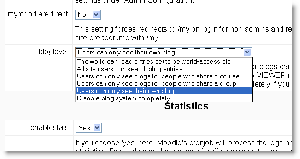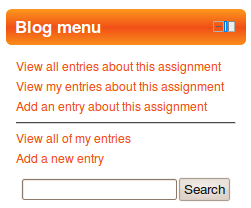Blogs: Difference between revisions
Helen Foster (talk | contribs) (Communication tools template) |
Helen Foster (talk | contribs) (Managing a Moodle site template) |
||
| Line 1: | Line 1: | ||
{{ | {{Managing a Moodle site}} | ||
The word 'blog' is a contraction of 'web log'. Blogs are a form of online journal used by millions of people around the world for self-expression and communicating with family and friends. Blogs are usually organized as a chronological series of postings created by the author of the blog. Blogs usually are written by one person, although some blogs can be authored by groups of people. | The word 'blog' is a contraction of 'web log'. Blogs are a form of online journal used by millions of people around the world for self-expression and communicating with family and friends. Blogs are usually organized as a chronological series of postings created by the author of the blog. Blogs usually are written by one person, although some blogs can be authored by groups of people. | ||
Revision as of 11:30, 11 October 2011
The word 'blog' is a contraction of 'web log'. Blogs are a form of online journal used by millions of people around the world for self-expression and communicating with family and friends. Blogs are usually organized as a chronological series of postings created by the author of the blog. Blogs usually are written by one person, although some blogs can be authored by groups of people.
Blogs in Moodle are user based - each user has their own Blog. Admins, teachers, and students can create Tags - Admins can create site level tags, teachers can create Course level tags, and students can create their own list of tags.
When a blog entry is created, a user can select which tags they wish to associate with their new entry. Multiple tags can be selected. Users can also select who they want the blog entry to be available to (depending on the blog visibility site setting).
Blogs in Moodle video:
<mediaplayer>http://www.youtube.com/watch?v=U7M3sZL6wts</mediaplayer>
Blog visibility
Site-wide blog visibility is set by an administrator via the bloglevel setting in Site administration > Appearance > Blog.
By default, all site users can see all blogs. Blog visibility may be restricted so that users can only see their own blog. A further option is to disable blogs completely.
Blog comments
Comments on blogs are enabled by default. The feature may be disabled by an administrator in Site administration > Appearance > Blog.
External blogs
Users can register external blogs, such as Blogger or Wordpress so that entries are automatically included in their Moodle blog. An administrator can set the number of external blogs each user is allowed to link to their Moodle blog (default is 1) and how often Moodle checks the external blogs for new entries (default is 24 hours) in Site administration > Appearance > Blog.
Blog associations
Two new capabilities:
enable users to blog about their course or a particular activity. The Blog menu block provides context-sensitive links for adding an entry.
The feature may be disabled by an administrator in Site administration > Appearance > Blog.
Course blogs
A new forum type "Standard forum displayed in a blog-like format" enables teachers to create forums which work as course blogs.
Sites upgrading to 2.0 which previously had blog visibility set to "Users can only see blogs for people who share a course" or "Users can only see blogs for people who share a group" will have blogs converted into blog-like format forums.
Blogs outside of Moodle
Many companies and organisations on the web provide blog sites and they are generally free. The largest company to do this is Blogger which is owned by Google. All you need to do is sign up for a free Gmail account. Edublogs also provides students and teachers with an easy to use interface for blogging. Edublogs does not require students to use email addresses to log in, which is nice because some school districts don't have email addresses for students- especially at the elementary level.
There are also many Open Source web applications that can be downloaded and installed freely. The most common of these is Wordpress.
See also
- Blogs FAQ
- Blog tags block
- Using Moodle Blogs forum
- Using Moodle Blogs and comments forum discussion
- Wikipedia on Blogs

